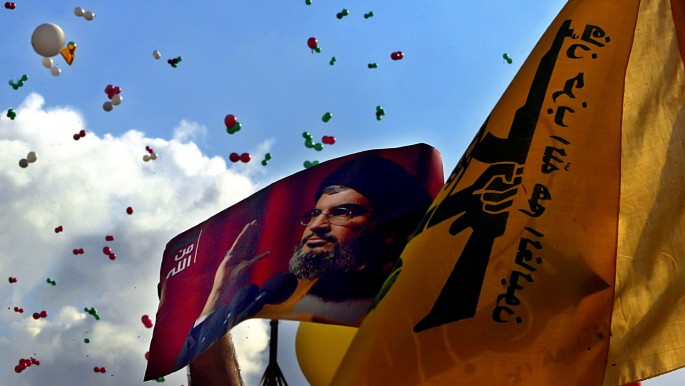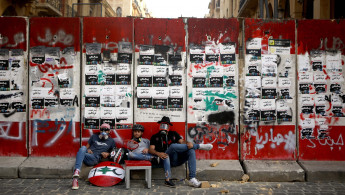Caesar Act: Lebanon weighs impact of US sanctions as economy nosedives
The Caesar Syria Civilian Protection Act, commonly referred to as simply the Caesar Act, goes into effect on 17 June, and the Lebanese government has found itself in a tricky situation.
The Caesar Act not only sanctions the Syrian regime and its allies, but also individuals involved economically or militarily with Damascus.
Prime Minister Hassan Diab and the cabinet have thus far remained silent on the matter. Information Minister Manal Abdelsamad said at a press conference last week that a ministerial committee would meet on Monday to discuss the Caesar Act, which will then present the cabinet with a proposal on the matter.
Foreign Minister Nassif Hitti said that the law does not target Lebanon but will have repercussions, further straining an already battered economy.
No public statements have been made on Monday's meeting, though reports have emerged of United States Ambassador Dorothy Shea's meeting with prime minister Diab and ministers claiming that she expressed her intention of Lebanon adopting provisions of the act into their policy.
 |
The Caesar Syria Civilian Protection Act goes into effect on 17 June, and the Lebanese government has found itself in a tricky situation |  |
Though political ties are frozen, Lebanon and Syria maintain economic relations. The war-torn country still sells electricity to its smaller next-door neighbour, while the latter is seen as Damascus' "gateway to the outside world", through its banks and remittances from seasonal workers. Trade - particularly through smuggling - has been a profitable venture for merchants on both sides of the border.
However, when it comes to the potential repercussions of the Caesar Act on Lebanon, Hezbollah, already facing sanctions from Washington DC, almost immediately comes to mind.
The Iran-backed group not only played a pivotal role in turning the tide of the Syrian conflict in favour of the Assad regime, but also expressed its intention to keep its armed forces in Syria as long as Damascus would like them to.
 |
|
| Read more: Syria Insight: Syria's collapsing economy threatens Assad's rule |
A US State Department Spokesperson told The New Arab by email that the Trump administration will continue to impose tough sanctions on Hezbollah.
"Hizballah's support of terrorist and illicit activities demonstrates that it is more concerned with its own interests and those of its patron Iran, than what is best for the Lebanese people," they said. "Maximum pressure will continue in order to reduce these threats to Lebanon and the region."
Declining to comment on whether these sanctions could reach entities in Lebanon in the future, it appears that Washington may not spare any of the Assad regime's patrons until political negotiations head towards a resolution.
"The Act seeks to deny the Assad regime the financial resources that his regime uses to fuel its campaign of violence and destruction that has killed hundreds," the spokesperson added. "We are committed to pressuring the Assad regime politically and economically until there is irreversible progress on the political process as called for in UNSCR 2254."
Head of Middle East and North Africa Department at the Heinrich Boll Foundation in Berlin Bente Scheller says that Hezbollah's military involvement in Syria is only part of the problem. "That is problematic for Lebanon because of Hezbollah's part in the government," Scheller told The New Arab.
 |
Lebanon is going through a crushing economic and fiscal crisis, with rising unemployment and projections of as much as 60 percent of the population living below the poverty line |  |
Lebanon's current government is often described as Hezbollah-backed, considering its rivals officially boycotted consultations and the dominance of the party's allies in the appointment of its 20 ministers.
Hezbollah's parliamentary bloc, Loyalty to the Resistance, condemned the Caesar Act in a statement last Thursday describing it as a "dictatorial measure revealing the insolence of the fake democracy in the United States."
"This measure will not make Syria and its people succumb, in the same way all US sanctions had failed to make Iran's Islamic Revolution and its people yield," the statement added.
 |
|
| Read more: 'Enough is enough': The fraught return of Lebanon's revolution |
Meanwhile, MP Jamil Essayed, close to Hezbollah and the Syrian regime, expressed his outrage in a tweet, describing the act as a form of "collective starvation", comparing it to nuclear, chemical, and biological weapons. "And Lebanon is on the list?!"
Lebanon is going through a crushing economic and fiscal crisis, with rising unemployment and projections of as much as 60 percent of the population living below the poverty line by the turn of the new year. Its currency has lost about 60 percent of its value.
It is currently negotiating with the International Monetary Fund, requesting $10 billion over a five-year period to help make its economy viable again.
 |
The law does not target Lebanon but will have repercussions, further straining an already battered economy |  |
In addition to international assistance, Lebanon has been banking on generating revenue through reconstruction projects in Syria next door in recent years. Then prime minister Saad Hariri and other officials in 2017 saw investing in Lebanese infrastructure as the prerequisite to investing in rebuilding Syria.
There were even plans to build a railway from the northern city of Tripoli to Syria, with the northern city's coastal special economic zone as a launching pad. As recently as January 2019, China expressed initial interest in investing in Tripoli's port, with reconstruction in Syria on the horizon.
 |
|
| Read more: Hezbollah and the IMF: Rhetoric over practice |
Executive Director of the Arab Reform Initiative, Nadim Houry, believes that Lebanese politicians have "sold it [reconstruction in Syria] as the magical exit for Lebanon's economic disaster", and does not necessarily see a missed opportunity in the first place.
"When you look at unemployment in Syria - it's not like there is this overflow of jobs," Houry said. "These initial forecasts were widely optimistic and exaggerated both in terms of what potential economic dividend would be in Syria and whether it would actually come to Lebanese companies."
With that said, Lebanon still has one eye on Syrian reconstruction as part of its economic recovery. A follow-up presentation with international donors from just last month revealed that part of its plan to revitalise its sluggish industrial sector is to "prioritize high-potential sectors", including "industries related to reconstruction in Syria."
Either way, Lebanese companies hoping to gain ground in the Syrian market in whatever capacity will face further risks. "The hope of Lebanese companies to benefit from reconstruction is now in void with construction being explicitly mentioned as a no-go," Scheller told The New Arab.
But with Lebanon seeking cash injections to help revitalise its own battered economy, Houry believes that fear of reprisals via the Caesar Act could deter potential investors. "If the US doesn't give much clarity [on implementing the law], it might deter many people," he said.
Follow him on Twitter: @chehayebk



